
Recently, Amazon purchased the right to make a TV show based on The Lord of Rings, which is a huge change of policy for the Tolkien Estate. Something that might be connected to the fact that J.R.R. Tolkien’s son Christopher Tolkien has stepped down as its director. Whatever the case, it seems reasonable to speculate that The Lord of the Rings might be receiving more than just the TV show should it perform well, which would introduce one of the foundational works of the fantasy canon to new generations.
Here are 20 things that you may or may not have known about The Lord of the Rings:
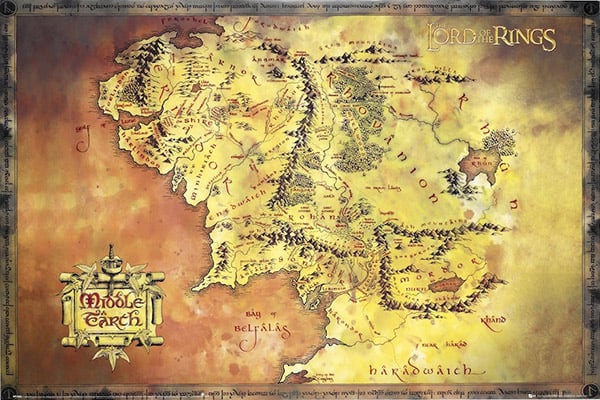
1. Middle Earth Is Presided Over By a Monotheistic God
This doesn’t come up much in either The Hobbit or The Lord of the Rings, but it is important to note that the setting is presided over by a monotheistic God. To be exact, it is presided over by Eru Ilúvatar, who is supposed to be the same as the God of the Bible.
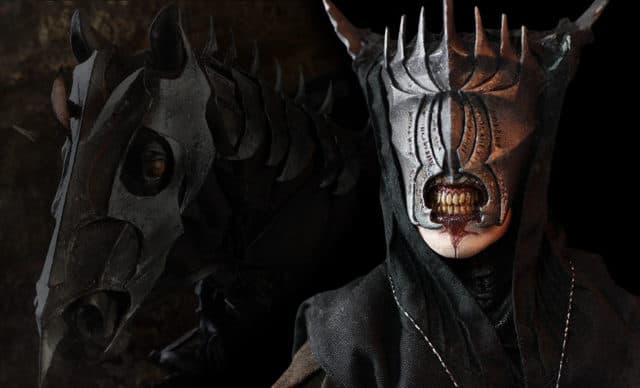
2. Sauron Wasn’t the First Dark Lord
Sauron isn’t the first figure to serve in the role of a “dark lord” for the setting. Instead, Sauron started out as a lieutenant of Melkor, who was one of the angelic powers created by Eru Ilúvatar but became corrupted because he wanted to replace his creator. By the time of The Lord of the Rings, Melkor had been banished from the world, though his evil influence can still be seen throughout the setting.
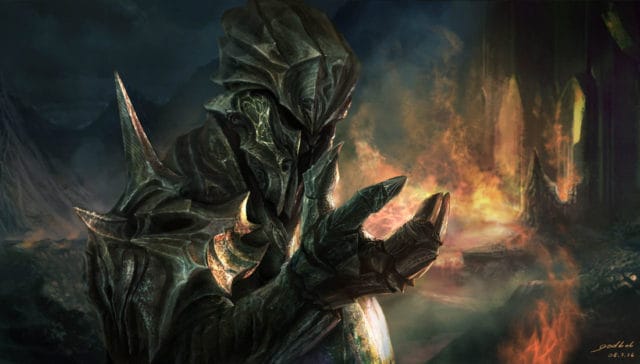
3. Melkor Wasn’t the Sole Power to Disobey Eru
Speaking of which, it is interesting to note that Melkor wasn’t the sole member of the angelic powers to go against Eru. Another was Aulë the Smith, who created the Dwarves because he couldn’t wait for the awakening of Eru’s creations to have someone to teach. However, when Eru asked him why Aulë had exceeded his authority, Aulë admitted his wrongdoing, which was followed by Eru accepting the Dwarves as his adopted children by instilling in them the independent will that had been missing from them until that point.

4. Sauron Was a Servant of Aulë
Both Melkor and Aulë were Valar, which were the most powerful of the angelic powers called the Ainur. However, there were plenty of other Ainur, which worked with various Valar as befitting their individual natures. In particular, it is interesting to note that Sauron started out as a servant of Aulë, which explains why he happened to be a great craftsman.
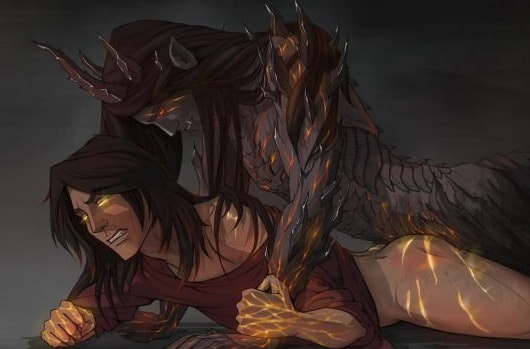
5. Sauron Was Obsessed with Order
Sauron was obsessed with order, which in turn, became synonymous with a dislike of what he perceived to be chaos and confusion. As a result, Sauron became corrupted by Melkor, which was a process helped along by Sauron’s admiration of Melkor’s ability to implement his plans in an effective and efficient manner. Due to this, Sauron was completely and utterly loyal to Melkor while Melkor was active in the setting.
6. The Wizards Were Ainur
The wizards in The Lord of the Rings were Ainur who had taken on human forms for the purpose of helping those who were opposed to Sauron. They took on aged appearances because they had hoped that the kings and other potentates would be more receptive to them thus. Something that was critical because the wizards were not supposed to match Sauron strength for strength, which is why they had limited use of their power while they were wizards.
7. Gandalf Didn’t Want to Go
Given his mission, it should come as no surprise to learn that Gandalf was held in high regard because of his wisdom. However, it is amusing to note that Gandalf didn’t actually want to go on the mission because he was afraid of Sauron’s power. Something that made him an even better choice in the eyes of his Vala master Manwë, who presided over the air in much the same way that Aulë presided over craftsmanship. With that said, Gandalf’s wisdom is one of the contributing factors to his break with Saruman because upon his initial arrival, an elf named Cirdan declared him to be the greatest of the Ainur who had been sent to help before presenting him with one of the Elven Rings of Power. Something that provoked much jealousy in Saruman when he learned of it.
8. Saruman Was a Servant of Aulë
Speaking of which, it is interesting to note that Saruman was a servant of Aulë as well. There are certain signs of this throughout the books. For example, Saruman shared Sauron’s strong interest in order, which was one of the reasons that he disliked counselling instead of outright commanding the rulers of Middle Earth. Furthermore, Saruman was associated with technology, which is why there is mention of his machinery as well as his use of an explosive in battle.
9. Radagast Was a Servant of Yavanna
Meanwhile, Radagast was a Servant of Yavanna, who was the spouse of Aulë as well as the Valar who presided over both plants and animals. Radagast is said to have been one of the wizards who failed their mission, which in his case, happened because he had become too obsessed with plants and animals. However, Christopher Tolkien has speculated that this might not have been the case because Yavanna had chosen him personally, meaning that it is not impossible that one of his responsibilities was protecting the plants and animals of Middle Earth from corruption.
10. No One Knows What Happened to the Blue Wizards
In total, five wizards were sent. Three of them were Saruman, Gandalf, and Radagast, while the other two were the Blue Wizards Alatar and Pallando. Unfortunately, no one knows what became of them, though it is known that they headed east for the purpose of disrupting Sauron in his own territories. J.R.R. Tolkien’s earlier statement is that they failed, whereas his later statement are more ambiguous, suggesting that they might have actually played a pivotal role in the overall victory against Sauron through unknown means.
11. Gondor Had a Sister-Realm
Gondor had a sister-realm called Arnor, which was founded by Elendil at around the same time that Gondor was founded by his sons Isildur and Anárion. For a time, Isildur ruled as the High King of both Arnor and Gondor because both his father and his brother had been killed in battle, but upon his death, the two realms became effectively independent from one another with independent ruling lines descended from the two brothers.
12. Arnor Was Destroyed By the Witch-King of Angmar
In time, Arnor became weaker and weaker. Something that was sped up by its separation into three kingdoms. Eventually, these three kingdoms were destroyed one by one by the Witch-King of Angmar, who was the leader of the Nazgûl. In the end, a coalition of Elves, Gondor soldiers, and the remnants of Arnor destroyed Angmar, but not before the Witch-King of Angmar had destroyed the last of the three successor states of Arnor. The Dúnedain who used to live in Arnor went on to form the Rangers of the North, while the rest of the population lived on in places such as Bree as well as the Shire.
13. The Last King of Gondor Was Rather Gullible
In The Lord of the Rings, Gondor was ruled by a hereditary lines of Stewards, which was necessary because the Last King of Gondor was rather gullible. In short, the 33rd King of Gondor Eärnur bore a grudge against the Witch-King of Angmar because his horse had fled when the Nazgûl made his appearance on the battlefield, which made it seem as though Eärnur had run off before regaining his courage. As a result, when the Witch-King of Angmar challenged him to single combat, Eärnur rode off with no more than a small number of bodyguards, which presumably led to his horrible demise.
14. Aragorn Spent Some Time Working For Denethor’s’ Father
It is interesting to note that Aragorn spent some time working for Denethor’s father Ecthelion under the name of Thorongil. In particular, it is worth noting that Aragorn pulled off a surprise attack on the Corsairs of Umbar, which devastated the ships that they relied upon for their naval raids. Something that was followed by Aragorn leaving Ecthelion’s service, which has been speculated to be because of his desire to avoid provoking civil war in Gondor because Ecthelion might have handed the rule of Gondor over to him rather than his own son. Since Amazon’s Lord of the Rings series is expected to focus on a younger Aragorn, it is possible that his time in Gondor will be one of the incidents covered.
15. Aragorn’s Claim Is Actually Pretty Weak
Legally speaking, it is amusing to note that Aragorn’s claim to the throne of Gondor is actually pretty weak. After all, he was descended from the ruling line of Arnor rather than the ruling line of Gondor. Granted, he had the royal power of Gondor because of the inter-marriage between the two ruling lines, but that is something that a significant chunk of Gondor’s nobility can claim. Instead, Aragorn’s path to the throne is based on his role in defending Gondor as well as Gondor’s people, which tends to be a more persuasive argument than pure legality.
16. The One Ring Was Symbolic
There are people who think that the One Ring is an allegory, but this is something that has always been denied by J.R.R. Tolkien. Instead, Tolkien has stated that symbolically, the One Ring represents the idea that if power is to be used, it has to be externalized. Something that causes it to escape the direct control of the person who possessed the power. As a result, it is no wonder that Sauron became diminished when he was without the One Ring into which he had invested much of his power.
17. Tolkien Didn’t Like Nazis
Tolkien loathed the Nazis. For example, it is known that when he was asked by a German publisher to prove that he was of “Aryan descent,” he mocked the idea by pointing out that Aryan actually refers to the Indo-Iranians while stating that if Germans continued asking such questions, he predicted a future in which having a German name would no longer be a source of pride for him as it had been even when he was fighting in the First World War.
18. Tolkien Was Dissatisfied with the Orcs
The orcs are one of the parts of The Lord of Rings that receive the most criticism in modern times for very understandable reasons. However, it is interesting to note that Tolkien himself was rather uncomfortable with what he had written, so much so that he continued to work on them until his passing. In short, he was very uncomfortable with the idea of a wholly evil species of thinking beings because of his religious beliefs, particularly since he had made it very clear in the books that orcs were indeed capable of independent thought.
19. Tolkien Was Deeply Affected By World War One
Tolkien served in the First World War as an officer. As a result, it should come as no surprise to learn that the conflict had an enormous influence on The Lord of the Rings in various ways. For example, the character of Samwise Gamgee was based on the common soldiers with whom he had become acquainted during the war, seeing as how he was an officer from a higher social class. Meanwhile, Frodo’s condition in the last stretch of the journey to Mordor is a very clear example of what would have been called “shell-shock” in those times but are not known as PTSD.
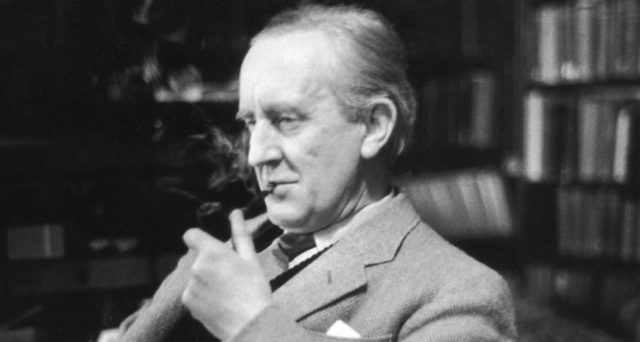
20. Tolkien Has Been Accused of Anti-Technology Views
Since Tolkien has been so influential, it is natural that his works have been much-discussed. In particular, it is interesting to note that he has been accused of having anti-technology views, which is true to an extent. However, it is important to note that much of Tolkien’s exposure to the newest technologies would have been the complete and utter horror show that was the First World War. For an example of its horrors, the soldiers fighting in the war would sometimes have to crawl out to cut the barbed wire fences erected by their enemies. Otherwise, their attacks were doomed to flounder on those fences, which would result in them being cut to pieces by machine gun fire. For that matter, it should be mentioned that while we have benefited much from the Industrial Revolution, it took a long time for those fruits to show. In contrast, the human cost as well as the environmental cost were much more immediate, as shown by the lethal “pea-soup” fog that became more common than ever in said period. In fact, one example in the London of 1952 killed 4,000 people in two days before going on to kill another 8,000 people in the days that followed.
 Follow Us
Follow Us



















